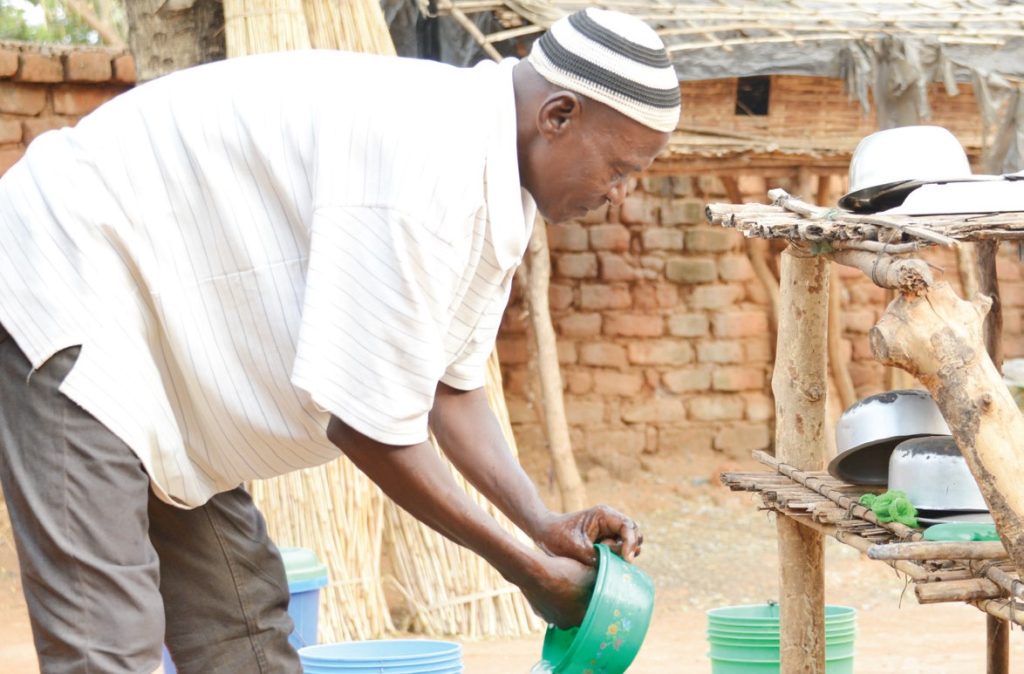Men’s response to transformative change
Group village Dura, real name Time Chisoko, comes from senior chief Ngokwe in Machinga district. He got married in 1995 and together with his wife Modester, they have five children.
In his community, there is an understanding where men and women have their roles in the family.

For example, it is taboo for a man to cook, wash clothes or draw water while his wife is around.
“Amati akudyetsa khuzumule kapena wahohowana [they say it is an effect of charms]” says Dura.
For Dura, that has also been his understanding. He has never dared to cook, wash clothes, or even draw water.
“These are roles and duties for women, and not men,” he said.
To him, it is normal. “It is what my fellow men have been doing and I found it normal,” he said.
This has been the case for Dura and other men in his village. Efforts to achieve gender equality have been solely left in the hands of women and girls, with little to no involvement of men.
While there have been some improvements in the situation for women and girls in Malawi, there is global understanding that gender equality will not be achieved until men engage as allies in transforming harmful gender norms.
In 2019, an effort to advocate for gender justice and achieve gender transformation came into play by Malawi Human Rights Resource Centre (MHRRC). The idea was to ensure that women and men, girls and boys work together to resist patriarchy.
This was a Sonke Gender Justice, a South African-based non-profit organisation working throughout Africa.
It was that moment when the MenEngage Programme started, focusing on efforts to prevent and respond to gender-based violence.
The programme also enhanced women’s participation in the public and political spheres by also seeking to rectify men’s negative use of power and the impact it can have on relationships.
MHRRC works as a bridge and links up with organisations in remote areas in implementing the project.
In Machinga, MHRRC worked with Forum for Youth Development (Foyode) which started engaging men to do chores wrongly believed to be women’s only.
Foyode executive director Mphatso Kapito says his organisation created a chief’s forum which helped them to engage faith leaders, chiefs and youths.
“Through those groups, we discussed a lot of ways on how men can be involved in helping women to ease the pressure they face. By doing so, we were also telling women to take part in other issues,” he said.
Through these efforts, Dura and other surrounding villages in senior chief Ngokwe have similar stories to share.
The first story to share is Dura, the village head himself, who is now a changed person. Our visit in October found a different Dura. We found him busy washing plates while his wife was fixing the pigeons’ house [dovecot].
He told us: “Today, I washed clothes, cooked nsima and also washed plates. My wife was around but I told her to rest. I have realised that it was wrong for me to let her do everything alone,” he said.
With that change, he said, people are calling him names when they see him washing plates or cooking.
“Akuti ndine wowawata, ena ati akazi anga andidyetsa khuzumule but I don’t care. I know what I am doing. These accusations will not change me,” he said.
Modester is happy to see her husband helping her with house chores.
“It feels like we have just been married, I am enjoying it because when I am tired or I am away, I pleasantly find that my husband has done everything at home,” she said.
In Phalombe, the narrative is the same as Vincent Makuluni of Phalombe Youth Organisation attests.
“We are in different T/A’s who are slowly beginning to understand the concept of the project and happily take part,” he said.
Gender activist Malawi Human Rights Resource Centre director Emma Kaliya says slowly the project is yielding results.
Kaliya, who is also founding member of a local association called Men for Gender Equality Now (Megen), deliberately created to have men take a role in women empowerment, says the going has been difficult as a lot of men have different beliefs.
“Hearing stories from different districts, you would agree with me that slowly men now understand the importance of this initiative. Of course, it is not easy,” said Kaliya.
Malawi is ranked 173rd out of 188 countries in the United Nations Gender Inequality. While the female population is 51 percent, only 27 percent of women participate in economic decision-making compared to around 70 percent of men.
In terms of leadership, women continue to be underrepresented in decision-making spaces, according to the 2023 European Union report.
As of 2019, women held 21 percent of parliamentary seats against the minimum requirement of the Gender Equality Act of 2013 which provides for a 40:60 quota for either sex.
However, as of 2022 the gains made in the 2019 general elections were lost after female-held parliamentary seats were lost during by-elections conducted after the demise of three female MPS.
Additionally, literacy levels are higher among men than women (73 percent versus 59 percent). Compared to men, women are overrepresented in sectors that have limited access to financial resources.





